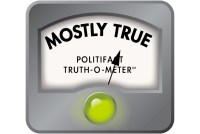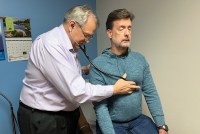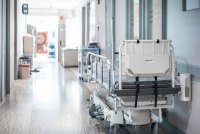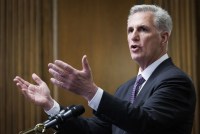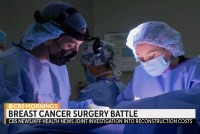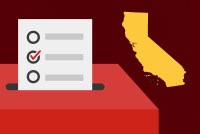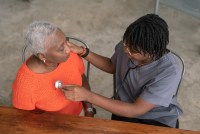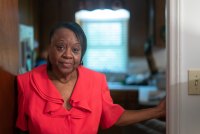Latest Morning Briefing Stories
What the Health? From KFF Health News: Debt Deal Leaves Health Programs (Mostly) Intact
The bipartisan deal to extend the U.S. government’s borrowing authority includes future cuts to federal health agencies, but they are smaller than many expected and do not touch Medicare and Medicaid. Meanwhile, Merck & Co. becomes the first drugmaker to sue Medicare officials over the federal health insurance program’s new authority to negotiate drug prices. Joanne Kenen of the Johns Hopkins Bloomberg School of Public Health and Politico, Lauren Weber of The Washington Post, and Jessie Hellmann of CQ Roll Call join KFF Health News’ chief Washington correspondent, Julie Rovner, to discuss these issues and more. Also this week, Rovner interviews KFF Health News senior correspondent Sarah Jane Tribble, who reported the latest KFF Health News-NPR “Bill of the Month” feature, about the perils of visiting the U.S. with European health insurance.
Personal Medical Debt in Los Angeles County Tops $2.6 Billion, Report Finds
Medical debt is a leading public health problem, researchers say. Despite the county’s ongoing expansion of health coverage, the prevalence of medical debt remained unchanged from 2017 to 2021.
Burnout Threatens Primary Care Workforce and Doctors’ Mental Health
Burnout is a widespread problem in the health care industry. Although the pandemic made things worse, burnout among doctors is a long-standing concern that health systems have become more focused on as they try to stop doctors from quitting or retiring early.
A Windfall in Health Insurance Rebates? It’s Not as Crazy as It Sounds
The billion-dollar amount cited by former Sen. Al Franken, while an estimate, is likely very close to what insurers will owe this year under a provision of the Affordable Care Act that compels rebates when insurers spend too little on actual medical care.
An Arm and a Leg: A ‘Payday Loan’ From a Health Care Behemoth
UnitedHealth Group is the largest health insurer in the United States. And it keeps growing. This has led some health care experts to call for antitrust regulation of this “behemoth” company.
Recovery From Addiction Is a Journey. There’s No One-and-Done Solution.
Drug use has become a major public health crisis, but effective treatment remains hard to find. It does exist though. Columnist Bernard J. Wolfson offers advice on finding help and says not to expect a quick solution.
As Fewer MDs Practice Rural Primary Care, a Different Type of Doctor Helps Take Up the Slack
The number of DOs is surging, and more than half of them practice in primary care, including in rural areas hit hard by doctor shortages.
California Confronts the Threat of ‘Tranq’ as Overdose Crisis Rages
California officials are stepping up efforts to combat the spread of xylazine, a powerful animal sedative that’s increasingly being used by people, often with devastating results. It’s mostly been an East Coast phenomenon, but ‘tranq,’ as it is known, is beginning to appear in the Golden State.
Will a ‘National Patient Safety Board,’ Modeled After the NTSB, Actually Fly?
A push is underway to create a National Patient Safety Board modeled after the National Transportation Safety Board, an independent federal agency that investigates plane crashes and other transportation disasters. But unlike the NTSB, some patient safety advocates say, the current proposal is toothless and wouldn’t provide transparency about the nation’s hospitals.
How to Negotiate With Resistant Aging Parents? Borrow These Tips From the Business World
Negotiation techniques can help health care providers and family caregivers find common ground with older adults who resist advice or support.
The Gun Violence Epidemic Is ‘Locking Us Back in Our Room’
As the leading cause of death for teens, firearm injuries are detrimental to more than just physical health. It takes a major toll on young people’s mental health.
The Debt Ceiling Deal Takes a Bite Out of Health Programs. It Could Have Been Much Worse.
A bipartisan deal to raise the government’s borrowing limit dashed Republican hopes for new Medicaid work requirements and other health spending cuts. Democrats secured the compromise by making relatively modest concessions, including ordering the return of unspent covid funds and limiting other health spending.
What the Health? From KFF Health News: Our 300th Episode!
When KFF Health News’ “What the Health?” podcast launched in 2017, Republicans in Washington were engaged in an (ultimately unsuccessful) campaign to “repeal and replace” the Affordable Care Act. The next six years would see a pandemic, increasingly unaffordable care, and a health care workforce experiencing unprecedented burnout. In the podcast’s 300th episode, host and chief Washington correspondent Julie Rovner explores the past and possible future of the U.S. health care system with three prominent “big thinkers” in health policy: Ezekiel Emanuel of the University of Pennsylvania, Jeff Goldsmith of Health Futures, and Farzad Mostashari of Aledade.
As Medicaid Purge Begins, ‘Staggering Numbers’ of Americans Lose Coverage
In what’s known as the Medicaid “unwinding,” states are combing through rolls to decide who stays and who goes. But the overwhelming majority of people who have lost coverage so far were dropped because of technicalities, not because officials determined they are no longer eligible.
More States OK Postpartum Medicaid Coverage Beyond Two Months
Montana, Alaska, Mississippi, Missouri, South Dakota, Texas, Utah, and Wyoming are among the latest states moving to provide health coverage for up to a year after pregnancy through the federal-state health insurance program for low-income people.
How a Medical Recoding May Limit Cancer Patients’ Options for Breast Reconstruction
The federal government’s arcane process for medical coding is influencing which reconstructive surgery options are available, creating anxiety for breast cancer patients.
Health Care Coalition Jockeys Over Medi-Cal Spending, Eyes Ballot Initiative
California Healthline has learned that a coalition of doctors, hospitals, insurers, and community clinics want to lock in a tax on health insurance companies to draw in extra Medicaid funding. It also wants to make the tax permanent.
Cardiovascular Disease Is Primed to Kill More Older Adults, Especially Blacks and Hispanics
Cardiovascular disease is the biggest killer of older Americans, with Black and Hispanic people at higher risk. Despite medical advances, researchers say, disparities are expected to worsen in the coming decades.
Many People Living in the ‘Diabetes Belt’ Are Plagued With Medical Debt
The “Diabetes Belt,” as defined by the Centers for Disease Control and Prevention, comprises 644 mostly Southern counties where diabetes rates are high. Of those counties, KFF Health News and NPR found, more than half also have high levels of medical debt.
Mammograms at 40? Breast Cancer Screening Guidelines Spark Fresh Debate
There is no direct evidence that screening women in their 40s will save lives, yet modeling suggests expanding routine mammography to include them might avert 1.3 deaths per 1,000. Highlighting the risk of false positives, some specialists call for a more personalized approach.






